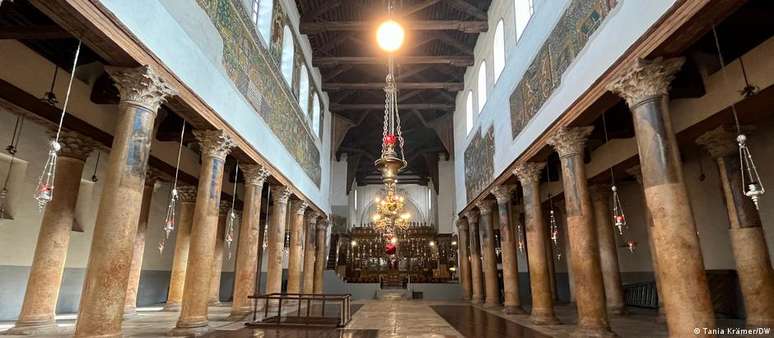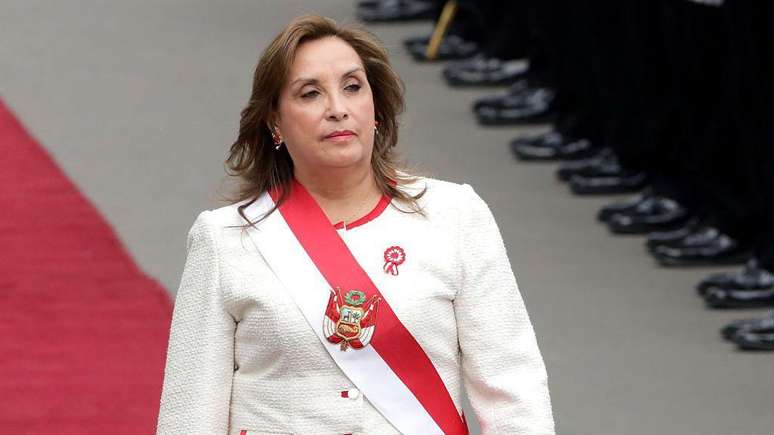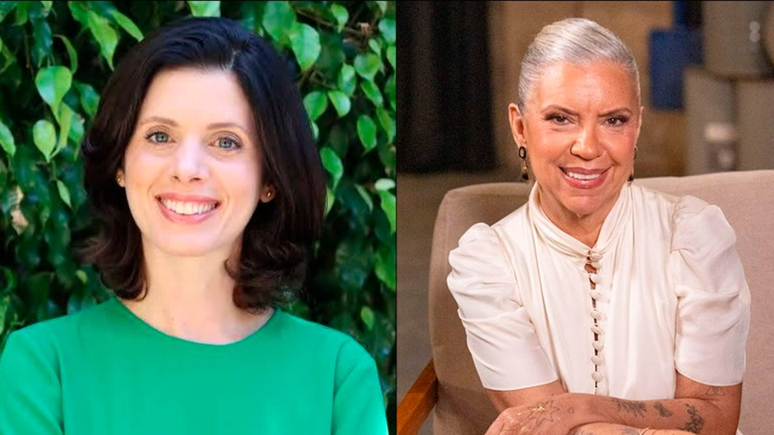Known as the birthplace of Jesus, the city in the occupied West Bank is usually crowded during the Christmas period. This year, in the midst of the conflict between Israel and Hamas, most of the celebrations were cancelled. Waiting for Christmas has always been the best thing, says Nuha Tarazi, as he places a bowl of Christmas cookies on the kitchen table. But this year is very different: there are no Christmas decorations in his house.
“Every year we looked forward to the holidays,” recalls the retired English teacher. “Who wants to think about celebrating Christmas now, with what’s going on in Gaza?”
For six years, Israeli authorities denied Tarazi the chance to visit his family in Gaza City. At Christmas, they were usually the ones allowed to visit her in the occupied West Bank.
Tarazi was born in Gaza City, but has lived for many decades in Beit Sahour, a city near Bethlehem. Many residents of Beit Sahour have family and friends in the Gaza Strip, where a small Christian community still exists.
During holidays such as Christmas or Easter, Israeli authorities often grant coveted exit permits to Palestinian Christians in Gaza, which has been ruled since 2007 by the Islamic fundamentalist group Hamas.
A different Christmas
Exit permission, however, is not always guaranteed. And often not all members of the same family can leave the enclave. In some years the number of permits was significantly reduced depending on the political situation.
But there was always the hope of seeing the family again during Christmas. Now everything is different again. Israel’s Erez border crossing was closed following the October 7 Hamas terrorist attacks and subsequent conflict with Israeli forces. This means that the road to the occupied West Bank and Jerusalem is also closed.
Additionally, Tarazi is mourning: His sister was killed in an Israeli attack on a building on the grounds of the Porphyrius Greek Orthodox Church in Gaza City in October. According to a statement from the Greek Orthodox Patriarchate, 18 people died in the attack, many of whom had sought refuge there.
“I am alone here and I don’t know how to deal with this situation. My thoughts only revolve around what is happening there in Gaza,” says Tarazi, who was unable to attend her sister’s funeral. Concern for other siblings and relatives is constant, just as communication is difficult. “The only thing that helps me is going to my garden, seeing my flowers and taking care of them,” she says.
No celebrations in Belém
Tarazi isn’t the only one who will stop celebrating Christmas this year. Even in Bethlehem, known as the birthplace of Jesus, there will be no Christmas holidays. The Manger Square in front of the Church of the Nativity, normally packed with thousands of local and foreign visitors during the Christmas period, is empty. They haven’t put up a big Christmas tree or nativity scene in the town, and there are no decorations or Christmas lights anywhere.
“There is no party atmosphere, there are no celebrations, because of what is happening in Palestine, in Gaza,” says Basel, who sells grilled chicken on Rua da Estrela, a historic street that leads to Praça da Manjedoura.
“Normally there would be many people from all over the world, of different religions, but there is no Christmas atmosphere – agrees Yara Alama, who lives in Belém. “The feeling is that you can’t feel any joy because of the war and what is happening to the people of Gaza.”
The Church of the Nativity, built on the site where Jesus is believed to have been born, is also unusually empty and quiet. There are no long lines of people waiting to visit the narrow cave below, where a silver star marks the sacred site.
First the pandemic, now the war
Issa Taljieh, born in Bethlehem, has been parish priest of the Greek Orthodox community of the Church for 12 years. In all this time, he says he has never experienced such a sad Christmas season.
“People suffer and are sad about what is happening in Gaza,” says the priest. “This is the first time that the Church of the Nativity, the place where Jesus was born, is empty like this. Even during Covid-19 there were still locals coming to celebrate Christmas with us.”
During the pandemic, foreign visitors have been unable to travel to Belém and the tourism sector on which the city depends has been severely affected. Since October 7, access to the city, already isolated from Jerusalem by the Israeli separation barrier, has become even more difficult. The Israeli army has installed barriers on many access roads, which people must cross on foot, and cars are only allowed to drive at certain times.
In Gaza, as of this Saturday (23/12), the Israeli retaliatory offensive had already killed more than 20,000 Palestinians, according to the enclave’s Ministry of Health.
In the West Bank, at least 491 Palestinians have been killed, according to the United Nations Office for the Coordination of Humanitarian Affairs (OCHA). This number makes 2023 the deadliest year for Palestinians in the West Bank since OCHA began recording fatalities in 2005.
In Israel, Hamas attacks on October 7 killed 1,200 people. Around 129 hostages are believed to still be held captive by the terrorist group in Gaza.
“A message of peace”
Father Issa, whose name means “Jesus” in Arabic, tries to help his congregation get through these difficult times. “We cannot celebrate in Bethlehem while people are being killed there in Gaza, while their homes are being destroyed. They are left homeless, without food, without a safe place and in the dead of winter. We must include them in our prayers and pray for peace and security “, it is read.
Although the holidays in the city were cancelled, the Christmas liturgies at the Church of the Nativity were maintained. On December 24, the Latin Patriarch of Jerusalem will enter Bethlehem, but this year without the musical accompaniment of Palestinian scout groups. The traditional midnight mass will also be held. About two weeks later, Orthodox communities will celebrate the Christmas holidays according to their own calendar.
Faced with the ongoing suffering and desperate situation in Gaza, it is important to draw strength from faith, says Father Rami Asakrieh, parish priest of the Latin parish of St. Catherine’s Church in Bethlehem.
“We need Christmas now. Yes, it will be a holiday without music, without scouts, without celebrations,” he says. “But it is important that we maintain the religious rituals, that there is a message of peace from this city to the world, a message of peace emanating from the birthplace of Jesus.”
Source: Terra
Rose James is a Gossipify movie and series reviewer known for her in-depth analysis and unique perspective on the latest releases. With a background in film studies, she provides engaging and informative reviews, and keeps readers up to date with industry trends and emerging talents.






